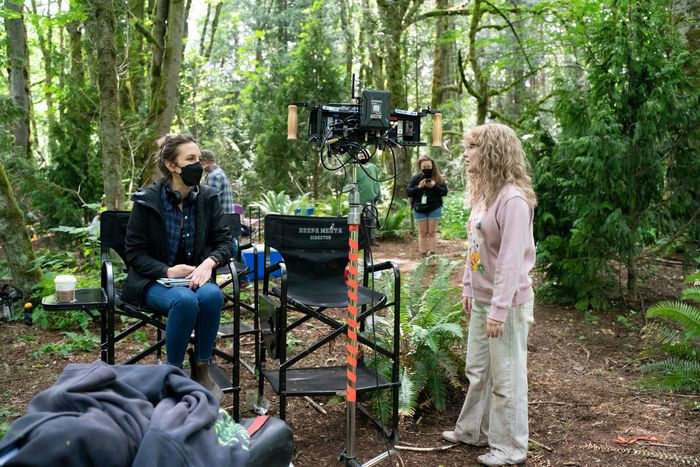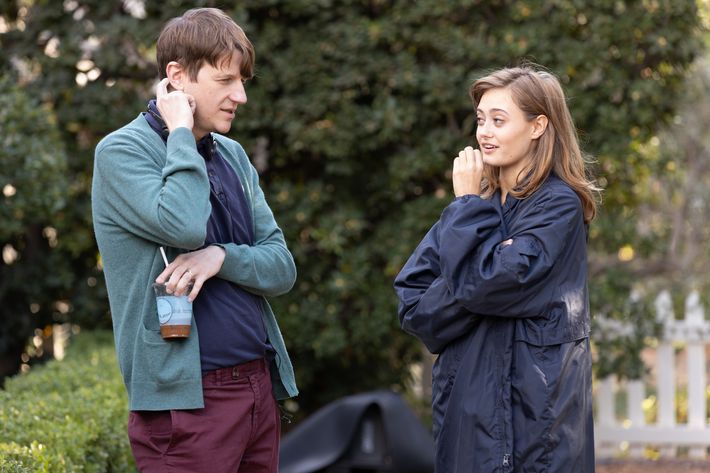
Spoilers are everywhere in this. Don’t say we didn’t warn you.
When Ashley Lyle and Bart Nickerson created Yellowjackets, they did not expect the Showtime series about a plane crash, the thorny relationships between a group of women, and a made-up book club to be as discussed, dissected, and scrutinized as it has been over the past ten weeks. The writing partners, who have been romantically involved since 2005 and married since 2016, are still figuring out how to navigate the many, many hyperspecific details that viewers and [cough] journalists are trying to uncover about the series, while still preserving a sense of mystery for future seasons. (A second is already in the works.)
That said, during a conversation over Zoom about Sunday’s eventful Yellowjackets season finale, Lyle and Nickerson were pretty forthcoming while being peppered with questions, including: Is Jackie, who seemingly froze to death after leaving the relative warmth of the cabin, definitely dead? If so, what is up with the journals Shauna found at her house? Are Taissa’s eyes really turning red, or are some people on Reddit (and, full disclosure, in Vulture Slack) imagining things? The duo did their best to be honest about as much as they could, unlike some people. (Misty, that cigarette thing was not cool.)
Here is an edited and condensed version of our conversation.
This show was well received when it first debuted, but it feels like it blew up in the last month or so. I’m wondering what that experience has been like for you, and whether you’re paying attention to the conversations on Reddit and things like that.
Ashley Lyle: It has been so surreal. I cannot stress that enough. It’s been really fun to watch, but it is strange as well, just seeing the momentum pick up. Like you said, even over the past two weeks, there’s been this shift. It feels like more and more people are watching, which is obviously really exciting for us. But it’s also a little anxiety producing, too. It’s like, “Oh yes, people are watching!” and “Oh no, people are watching,” which I feel like any writer or creator would probably empathize with.
Bart and I took a little vacation between seasons to try to clear our heads and refill the well and do all that stuff. Of course I’m just sitting there on Twitter the whole fucking time. And I’ve definitely dabbled in Reddit. Then Bart, who’s a little less active on social media, gets everything filtered through me. I’m always like, “Look at this meme.”
Bart Nickerson: I was on Twitter for like three months five years ago, and I just couldn’t do anything else. So the process we have is, Ash seems to consume a great deal of it, and then she shows it to me. As long as I can’t touch the buttons, it seems I’m able to go in and out without getting too obsessed.
Are you worried it would affect you creatively, in terms of writing the show, if you saw too much feedback?
B.N.: There is a concern that I have about that, but that’s more intellectual. Just for me, I feel like the consistent feedback so quickly can become its own cyclical thing, and that is not going to lead to the best quality of life.
A.L.: I think it’s good that we had written and shot the entire first season before it aired, so that, for better or for worse, we cannot change the course based on how people are receiving it. People have incredibly creative theories about what’s going on in the show, and some people have been right, and some people are very off base, but in very creative and impressively entertaining ways. Moving forward, the important thing for us to keep in mind is that there’s a difference between fan appreciation and fan service. You never want to tip from one into the other. We’re so grateful to our viewers and we’re so excited by the engagement and passion some people seem to have for the show. But I think we have to process what people are so excited about, and I think that’s really fun and useful for us, but also stay the course of what keeps us excited about the show, and our writers excited about the show, and have some faith in that as our guiding creative light.
All right, so: the finale. I’m going to ask a question that’s going to sound ridiculous, but humor me. We see that Jackie appears to have frozen to death. Is there any reason we should believe she’s not actually dead?
B.N.: First of all, I don’t think that’s ridiculous at all. She’s dead, but I think it is fair to question these things because one of the things the show is trying to do is play with the subjectivity of experience. So I do think it’s fair game to ask whether or not a thing you’re seeing is happening, because there are ways that experience, like past and present and future, can be warped. There is something strange and new about this level of discourse that involves us while we’re creating a product, and so I guess this could be a mistake, but she’s dead in terms of our story. I hope that doesn’t lessen people’s enjoyment, because at the same time, the theorizing and the speculation does seem to be a big fun part of the show.
Now, I will say Jackie’s presence will loom very large throughout the show. Her as a gravity, having an impact on the constellation of the other characters, is not even close to through.
So then I have another question: There’s a scene when Shauna is at Jackie’s parents’ house and she sees these journals we assume are written by Jackie, that refer to movies that came out after the crash. Were those supposed to be things Jackie had written? Or is this, again, a perception thing?
A.L.: They were not meant to be things that Jackie herself had written.
Okay. Can you say more than that?
B.N.: I think we’ve said it other places — again, it’s just so hard, because I don’t think we want to tease it as a secret, because it’s not necessarily a big plot reveal as much as it is a character piece idea, but it could be distracting to leave it.
A.L.: I will say, we did not necessarily anticipate people screen-shotting that the way they did. So to our minds, it was a character Easter egg, and not a plot Easter egg.
Shauna at some point does return from the wilderness, as we know, because we see Melanie Lynskey. So we felt like we could potentially dramatize her initial experience of that survivor’s guilt, and we thought there was something really compelling, to us at least, about this ritual of having to go to Jackie’s parents’ house every year and be this surrogate daughter figure to them, while having this intense feeling of complicity in Jackie’s death. What would that be like for her? How would she manifest those feelings of guilt? And so again, it’s something we didn’t fully dramatize this season, and we did not necessarily anticipate people locking onto those very, very tiny details and then assuming Jackie’s a time traveler.
B.N.: But I will say that I personally, and I think Ash would agree — I just think it’s so fun that that happened. For people to be responding to this world as one in which that could be possible, I think it’s exactly where we want to be.
In terms of filling in some of those gaps about things that happen immediately after they return, are these areas you intend to explore in the future?
A.L.: Yeah.
Another thing people have been speculating about a lot is, in the very beginning of the pilot, we see some of the girls seemingly feasting on unidentified person. Are you trying to be ambiguous about that?
A.L.: We were absolutely trying to be ambiguous about the identity of the pit girl, as I know everyone is calling her now. The question of who she is will eventually be answered. We definitely took pains over the course of the production of the first season to essentially, not hide the ball in a cruel way, but create more mystery. To our minds, it’s a very natural thing for girls to share clothes. I shared clothes with my best friend in high school. So the Converse sneakers, for example, they’ve appeared on multiple characters over the course of the first season. Obviously not everyone has the same shoe size, but with that large of a group of people, it’s going to be ballpark.
And in those circumstances, you just need to keep your feet warm.
A.L.: Exactly. So we tried to be careful about not necessarily always having a one-to-one with what piece of clothing or which pair of shoes went with which character, and we knew people would make the assumption that it was Jackie amongst other potential candidates. By the end of the first season she should be taken off the table as the girl in the pit, at least.
There’s something that Juliette Lewis has said both at our Vulture Fest panel and also in the New York Times about Natalie’s arc devolving. Did she have a different idea of where that character was going to go, and was she surprised by where the story went?
A.L.: I think Juliette does such an incredible job with this character over the course of the first season, but I think in some ways she had the tallest order of any of the adult women, because her character is in such a precarious emotional place and she’s hanging all of her hopes on the idea that she still has some control. That control is coming from the mystery and what she sees as this conspiracy of Travis’s death. She’s clinging to that. She did a beautiful job in the scene in episode eight, when she’s talking to Suzie, her former sponsor, and we learn why she is so absolutely convinced that it could not have been a suicide: Because they made this pact, and that has clearly saved her life. For her to let go of or accept the idea that he might have broken that pact is the last thread tethering her to her own belief system.
To some extent that’s further substantiated by Shauna, who’s saying, “Look, this could be false pattern recognition, this could be paranoia. Maybe we are just fucked-up. Maybe we just can’t see the world for what it is.” Shauna is, to some extent, manipulating her, because she does not want her digging [into Adam’s death]. But Shauna’s also talking about herself because that’s exactly what happened with her and Adam. There’s both a real, essential truthfulness to what Shauna is saying, and there’s a manipulation and a lie inherent to what she’s saying. It almost pushes Natalie over the brink, and then of course at the very end of the finale, [we] kind of flip the script and say, “No, there is an external threat. You were correct in thinking that something is going on here.”
We knew we had to get her to that brink before we could validate her experience. I think Juliette is a very instinctive actor, and I think she’s a very emotional actor in a really beautiful way, and I can’t imagine going to that darker place was easy for her. Truthfully, when we shot the pilot, we weren’t discussing all of that arc with her. We had talked a lot about Natalie as a character and the inner dichotomy in that she is, in certain ways, the most emotionally honest, but in certain ways the most emotionally volatile. So all of that was part of the conversation, but I think that as the story progressed and the darker things took a turn for Natalie, I’m not surprised that it was difficult to inhabit that place for her.
When you shot the pilot, had you finished writing the whole season?
B.N.: No, it was just the pilot. We hadn’t even started to break the season. We pitched with a pretty elaborate plan for a few seasons, but in terms of the actual work of breaking the individual pieces that would become the season, it was more of a blueprint.
For instance, some of the details in the finale, like Natalie getting kidnapped or Taissa winning the election — had you figured that stuff out yet, or were you still working through that?
A.L.: I mean, we had figured out some of it, and we knew what type of place we wanted to take each character, but it can be a little bit tricky sometimes. You never want to tell your collaborators something as though it’s concrete when it can change. We have an incredibly talented group of writers and we find that it’s really valuable to be open to those contributions. You have to stay on course or else everything can go sideways on you, but at the same time, you have to be flexible enough to adapt and evolve and let the story find its own path to some extent.
B.N.: Ultimately Natalie is this very powerful character, but all of our characters have a certain — I don’t want to call it a fragility, because that’s not right. It’s more that they have wounds that can be accessed, and that was what the story started to move into.
To go back to Natalie’s suspicions about Adam: is he connected to this group that comes in and kidnaps her?
B.N.: No, he is not involved in that organization. Again, a fair question. Just to clarify what Ashley said: The paranoia and those kinds of theories were the intent of the way we had his story unfold. The hope was to make the audience somewhat complicit in his murder, because that paranoia is one of the outgrowths of Shauna’s trauma, and the way she sees the world right now was the subjective experience we were after.
We’re learning as we go, with this show in particular, that certain things end up feeling like a trap. You don’t necessarily want to close doors story-wise, but it feels like pleading the fifth is its own answer. If we were to say, “I plead the fifth on this one, if he’s involved,” it feels like people are going to be like, “Oh my God, he’s definitely involved now.”
Yeah, you’re right. If you haven’t already, I feel like you guys should have lunch with Damon Lindelof and Carlton Cuse.
B.N.: I mean, one, that would just be so cool. But I know that with the shows or books or movies that I love, it’s like, I want those answers, too. I find myself grappling with my relationship to spoilers and the quote “truth” of the story; I also want to know about the people that made them, and I want all the behind-the-scenes details. But there are times where I’m afraid that I’m lessening the experience for myself. It’s like, I want to know who shot J.R., but then I find out and I’m like, God, maybe I should have just experienced it.
I have a question about Taissa. There’s been a lot of conversation about her eyes, because in certain shots they look like they might be kind of red. People aren’t sure if they’re imagining it or if it’s intentional. Tawny Cypress, the actress who plays her, has very striking green eyes, so she must be wearing contacts because her eyes are brown on the show. Is there anything you can say about that?
AL: There are a lot of contacts happening on the show to help with our matching [the older and younger characters]. Sophie Nélisse is wearing contacts, Samantha Hanratty is wearing contacts, and Tawny is wearing contacts, and that’s because it is always easier to go from light to dark, as opposed to the other way around. It can look extremely unnatural when you’re putting green contacts on Jasmin Savoy Brown’s brown eyes. And in the case of the reddishness, that is essentially a consequence of the colored contact situation. It works. It’s sort of a happy accident, because when people say, “Oh, her eyes look a little bit off,” I mean, her character is a little bit off. Sometimes I just think the universe is helping you out a bit.
I don’t know if “possessed” is the right word, but there certainly seems to be something going on with her where she has a whole other, darker side to her, which I assume we’re going to find out more about.
B.N.: Yeah, for sure. One of the things that we want to play with in season two is what is going to happen for Taissa once she realizes that she might be, on a certain level, benefiting from whatever that is. And then, how does she reconcile that?
When you say benefiting, what do you mean?
B.N.: The final shot of her in the finale, winning the election: What we were attempting to imply is that, while she might not literally know the full extent of what she’s been doing while sleepwalking, there is a felt sense of this improbable victory coming from that. I want to stress that it is a sense of her believing there’s a connection between the victory and that thing happening to her — that is not necessarily to say it’s 100 percent true that those two things are connected.
In other words, she feels like she’s gaining some kind of power from whatever’s going on, even though she’s afraid of it at the same time.
A.L.: Yes.
I’m wondering if, in the future, we’re going to see any of the Yellowjackets we haven’t yet seen as adults. There’s a reference to Lottie in the finale suggesting she’s out there somewhere, and there’s already a lot of people online making casting suggestions about that. Will we get to see more of some of these girls as adults?
A.L.: We will. That is absolutely the intention.
Are you taking casting suggestions?
B.N.: We are definitely taking casting suggestions.
A.L.: We’re in early stages. We have not cast anybody yet. And people have made some really brilliant suggestions. We were joking earlier, like, if enough people say it, maybe they are legally bound: You’ve been drafted by the internet, you have to be in our show, so buckle up. Unfortunately that is not how the world works, but that’s something we’re very excited about moving into season two.
One of my colleagues is writing an entire piece about who should be cast, so take that under advisement.
A.L.: There have been some really brilliant adult Jackie suggestions, and I’m like, “Oh …” But please, give us what you got.
I just want Claire Danes to be involved in some way. I don’t know how or why.
A.L.: Obviously Claire Danes has done excellent work in many, many projects since then, but My So-Called Life is an absolute touchstone for me personally. Angela Chase for life.
When I moderated the Yellowjackets panel at Vulture Fest, I asked the cast if there were ever songs written into the script. They said they didn’t remember that, but did you have specific songs in mind when you were writing certain scenes?
A.L.: We did. It’s funny they don’t remember that, although it also feels like we shot the pilot 5 million years ago, so it makes sense. I remember very distinctly a few of them, only because in terms of the rules of screenwriting, you’re never supposed to script in music, and we felt like, well, to hell with it. If we have this opportunity to write this script, we’re going to do what we want with it. So we did script the Liz Phair and the PJ Harvey. Those were really important to us in terms of setting the tone. And I believe we also scripted “Informer” by Snow. They just felt so right to us. And they’re both songs and artists that mean a lot to us personally
So where are you guys in terms of season two? Have you started writing it yet?
A.L.: We’re getting underway.
Bart, you said earlier you have a blueprint for multiple seasons. Do you have an ending in mind? Is it that specific yet?
B.N.: We do have some ideas about how it ends, again, in a way where it is very flexible. But there is an endgame, I guess you would say, in terms of what we want these stories to be funneling towards, and how it will conclude.
How many seasons do you imagine it being, ideally?
A.L.: We originally pitched it as five seasons. To some extent that’s just a function of how you have to pitch a show. When buyers are hearing ideas, particularly at a network like Showtime, they want to know that you have a plan and there’s more than one season worth of story. I believe we’ve said five seasons earlier in interviews and have regretted it every day since, because people really latched onto that. I think what we’ll say about that is that we have a plan, and we do feel very good about the potential for story moving forward. But we have no interest in beating a dead horse or dragging things out longer than the story dictates. I think that to some extent the show and the story and the characters will tell us when they’ve reached a natural conclusion. But for now, we feel really good about moving forward, and we feel confident that we have a lot of good stuff that we’re excited about. And all you can do is really hope that other people will be excited as well.






